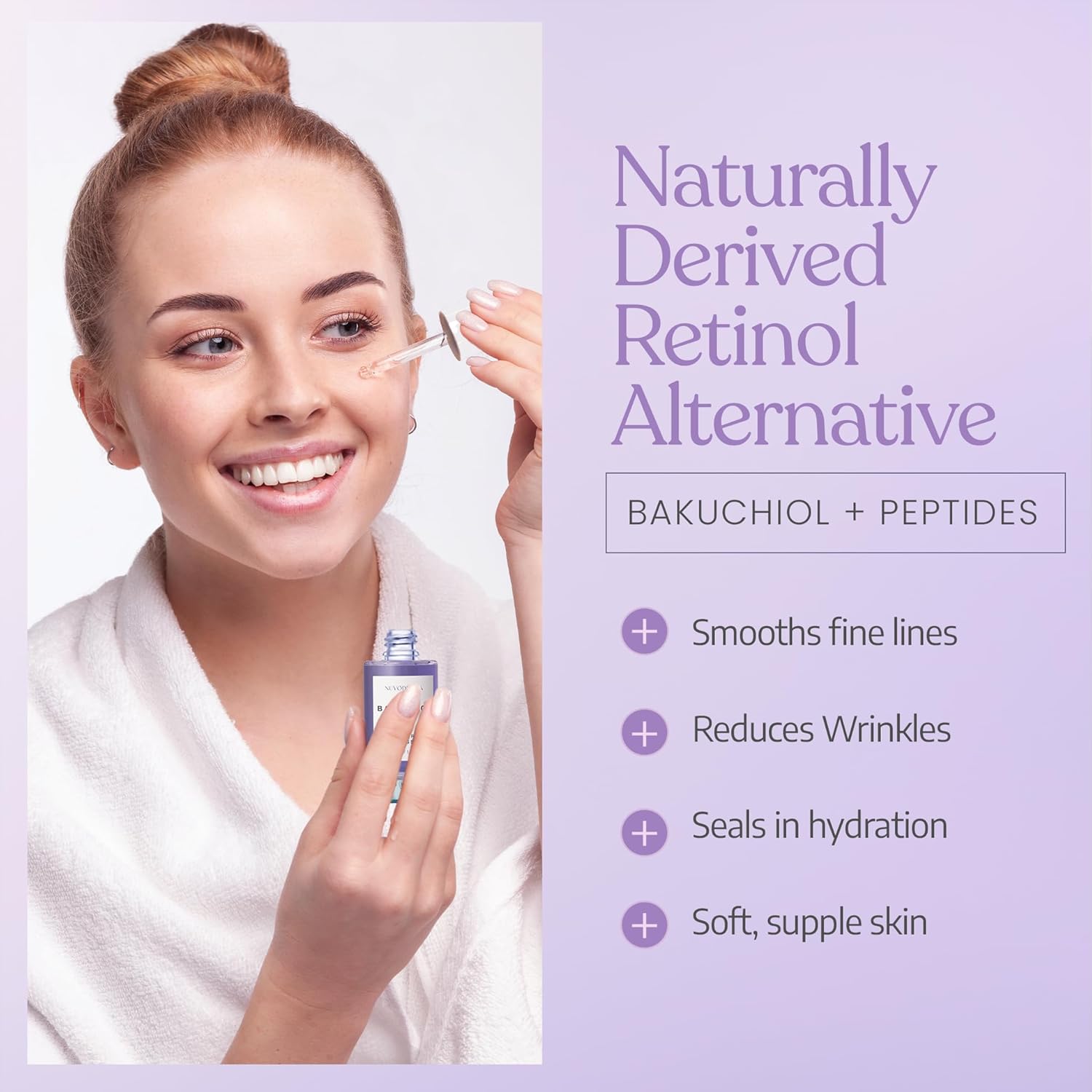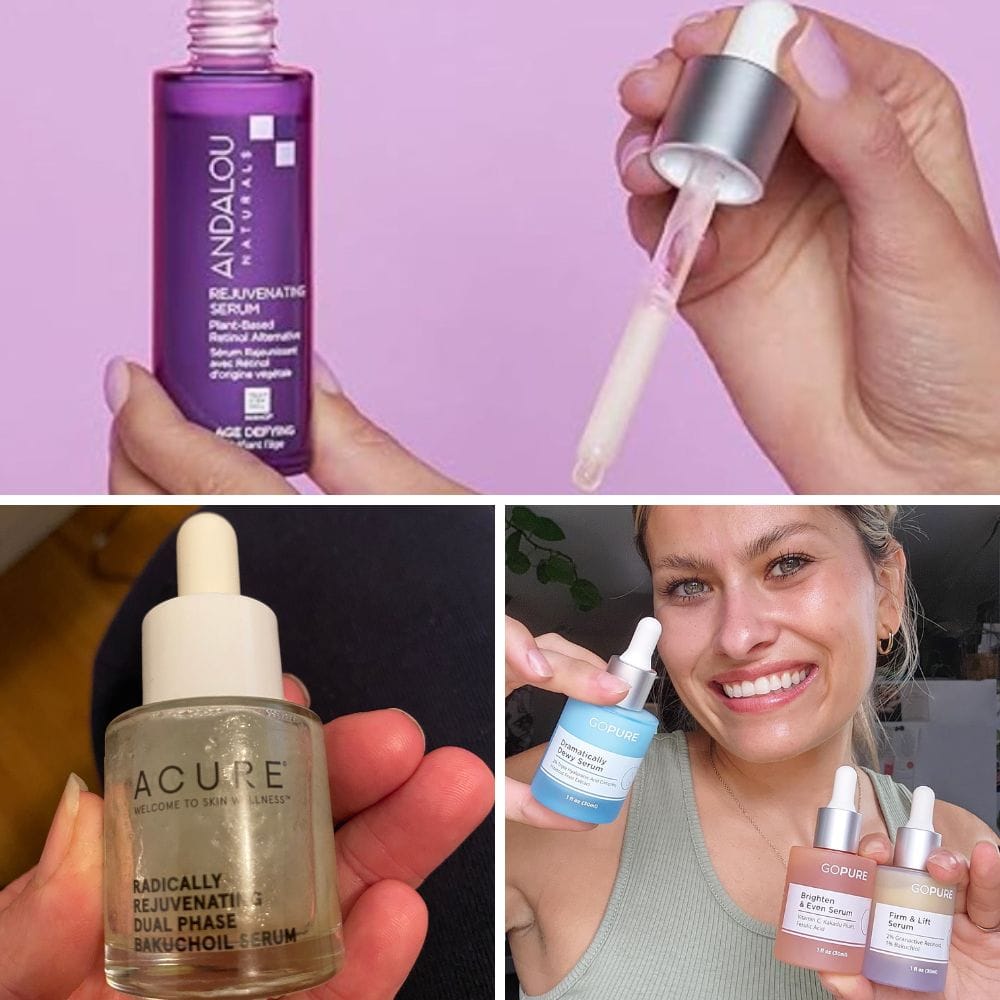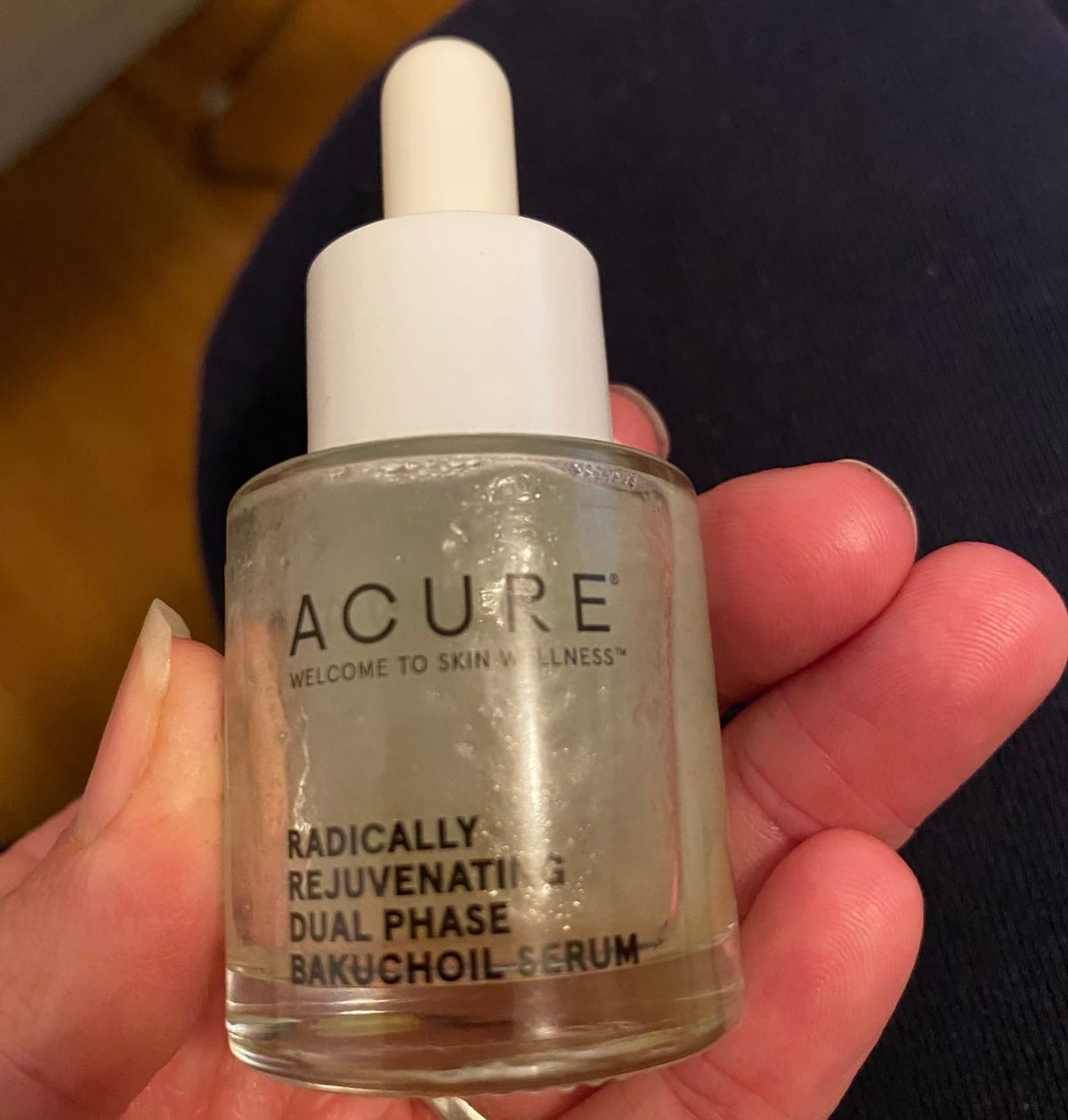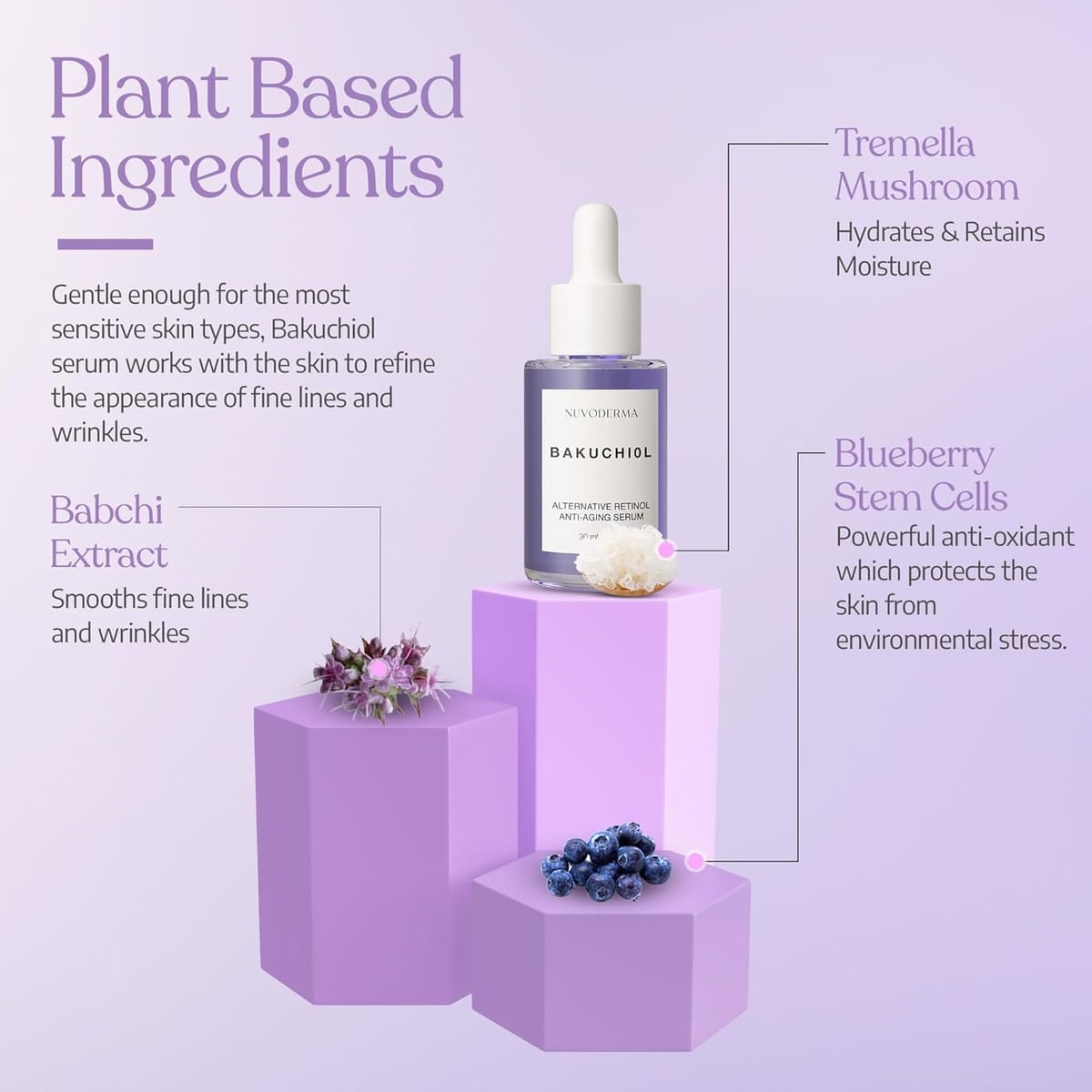Key Takeaways:
- Bakuchiol is a plant-based retinol alternative with fewer side effects.
- Potential side effects include skin irritation, redness, and sensitivity.
- Patch testing is crucial to avoid adverse reactions.
Introduction to Bakuchiol
Bakuchiol, derived from the seeds and leaves of the babchi plant, has gained popularity as a natural alternative to retinol. Known for its anti-aging effects, bakuchiol is celebrated for its ability to smooth fine lines and wrinkles, improve skin tone, and enhance overall skin health. However, like any skincare ingredient, it is essential to understand the potential side effects of bakuchiol serum before incorporating it into your skin care routine.
Benefits of Bakuchiol

Bakuchiol offers numerous skin care benefits, making it a sought-after ingredient in the beauty industry. It promotes collagen production, which helps maintain the skin's elasticity and firmness. Additionally, bakuchiol improves skin texture and tone, resulting in radiant skin. Unlike retinol products, bakuchiol is gentler on the skin, making it suitable for sensitive skin types.
Another significant advantage of bakuchiol is its ability to treat acne breakouts. By increasing cell turnover, bakuchiol helps unclog pores and reduce the occurrence of acne. This plant-based retinol alternative also addresses dark spots and sun damage, contributing to a more even skin tone.
Potential Side Effects of Bakuchiol Serum
While bakuchiol is generally considered safe, some individuals may experience side effects. Skin irritation is one of the most common issues reported. This can manifest as redness, itching, or a burning sensation. It is crucial to monitor how your skin reacts to bakuchiol and discontinue use if irritation persists.
Another potential side effect is increased skin sensitivity. Bakuchiol can make the skin more susceptible to environmental factors, such as sun exposure. To mitigate this risk, it is advisable to use sun protection when incorporating bakuchiol into your skincare routine.
Skin Irritation and Redness
Skin irritation and redness are common side effects of bakuchiol serum. These reactions occur as the skin adjusts to the new ingredient. To minimize irritation, start with a lower concentration of bakuchiol and gradually increase it as your skin builds tolerance.
If you experience persistent redness or discomfort, consider reducing the frequency of application. Using a gentle cleanser and hydrating moisturizer can also help soothe irritated skin. Always perform a patch test before applying bakuchiol serum to your face to ensure you do not have an adverse reaction.
Increased Skin Sensitivity
Bakuchiol can increase skin sensitivity, making it more prone to sun damage. To protect your skin, make sure to include a broad-spectrum sunscreen with at least SPF 30 in your daily skincare routine. This will help prevent sunburn and further irritation.
Additionally, avoid using other potent ingredients, such as vitamin C or prescription retinoids, simultaneously with bakuchiol. Combining these active ingredients can exacerbate skin sensitivity and lead to adverse reactions. Instead, alternate their use to give your skin time to adjust.
Patch Testing: A Crucial Step
Patch testing is essential when introducing any new skincare product, including bakuchiol serum. Apply a small amount of the serum to a discreet area of your skin, such as the inside of your wrist or behind your ear. Wait 24 to 48 hours to observe any adverse reactions.
If you do not experience any irritation or redness, it is likely safe to use the product on your face. However, if you notice any discomfort, discontinue use immediately. Patch testing helps identify potential allergies or sensitivities, ensuring a safer skincare experience.
Bakuchiol vs. Retinol: A Comparison
Bakuchiol and retinol are both known for their anti-aging effects, but they differ in their side effect profiles. Retinol, a derivative of vitamin A, is known for causing skin irritation, dryness, and peeling. In contrast, bakuchiol is a gentler alternative with a lower risk of adverse reactions.
While retinol is effective in promoting healthy cell regeneration and treating acne, it can be too harsh for sensitive skin types. Bakuchiol offers similar benefits without the same level of irritation, making it a suitable option for those with delicate skin.
Combining Bakuchiol with Other Skincare Ingredients
When incorporating bakuchiol into your skincare routine, it is essential to consider how it interacts with other ingredients. Bakuchiol pairs well with hydrating ingredients like hyaluronic acid, which helps maintain skin moisture and plumpness.
However, be cautious when using bakuchiol alongside other active ingredients, such as vitamin C or topical retinoids. These combinations can increase the risk of skin irritation and sensitivity. To avoid adverse reactions, alternate the use of these potent ingredients or consult a dermatologist for personalized advice.
Addressing Skin Discoloration and Dark Spots
Bakuchiol is effective in addressing skin discoloration and dark spots. By promoting increased cell turnover, bakuchiol helps fade hyperpigmentation and even out skin tone. This makes it a valuable addition to any skincare routine aimed at achieving a more uniform complexion.
For best results, use bakuchiol serum consistently and pair it with a broad-spectrum sunscreen to protect against further sun damage. Over time, you will notice an improvement in the appearance of dark spots and a more radiant skin tone.
Treating Acne with Bakuchiol
Bakuchiol is beneficial for treating acne due to its ability to increase cell turnover and unclog pores. This helps reduce the occurrence of acne breakouts and promotes clearer skin. Additionally, bakuchiol's anti-inflammatory properties can help soothe existing acne and prevent further irritation.
Incorporate bakuchiol serum into your skincare routine gradually, starting with a lower concentration to avoid potential irritation. Consistent use will yield the best results, leading to improved skin quality and fewer acne breakouts.
Bakuchiol for Sensitive Skin Types
Sensitive skin types often struggle to find effective anti-aging products that do not irritate. Bakuchiol is a suitable option for those with delicate skin, as it offers the benefits of retinol without the same level of harshness.
To ensure a positive experience, start with a lower concentration of bakuchiol and gradually increase it as your skin builds tolerance. Pairing bakuchiol with soothing ingredients, such as hyaluronic acid, can further enhance its benefits and minimize the risk of irritation.
The Importance of Sun Protection
Sun protection is essential when using bakuchiol serum, as it can increase skin sensitivity to UV rays. Incorporate a broad-spectrum sunscreen with at least SPF 30 into your daily skin care routine to prevent sunburn and further irritation.
Additionally, consider wearing protective clothing and seeking shade during peak sun hours. These measures will help safeguard your skin and maintain the benefits of bakuchiol without compromising your skin's health.
Monitoring Your Skin's Reaction
Regularly monitor your skin's reaction to bakuchiol serum to ensure it is well-tolerated. Pay attention to any signs of irritation, redness, or increased sensitivity. If you notice any adverse reactions, adjust the frequency of application or discontinue use altogether.
Consult a dermatologist if you experience persistent discomfort or if you have concerns about incorporating bakuchiol into your skincare routine. Professional guidance can help you navigate potential side effects and achieve the best results for your skin.


Can bakuchiol cause skin irritation?
Yes, bakuchiol can cause skin irritation, especially when first introduced into your skincare routine. Common signs of irritation include skin redness, itching, and a burning sensation. To minimize irritation, start with a lower concentration of bakuchiol and gradually increase it as your skin builds tolerance.
Is bakuchiol suitable for sensitive skin types?
Bakuchiol is generally considered suitable for sensitive skin types due to its gentler nature compared to retinol. However, it is essential to perform a patch test before using bakuchiol serum on your face to ensure you do not have an adverse reaction. Start with a lower concentration and gradually increase it to avoid potential irritation.
How can I protect my skin while using bakuchiol serum?
To protect your skin while using bakuchiol serum, incorporate a broad-spectrum sunscreen with at least SPF 30 into your daily skincare routine. This will help prevent sunburn and further irritation. Additionally, avoid using other potent ingredients, such as vitamin C or prescription retinoids, simultaneously with bakuchiol to reduce the risk of increased sensitivity.

Bakuchiol serum offers numerous benefits, including improved skin tone, reduced fine lines and wrinkles, and enhanced skin texture. However, it is essential to be aware of potential side effects, such as skin irritation, redness, and increased sensitivity. Patch testing and sun protection are crucial steps to ensure a safe and effective skincare experience. By monitoring your skin's reaction and adjusting your routine as needed, you can enjoy the benefits of bakuchiol while minimizing the risk of adverse effects.











